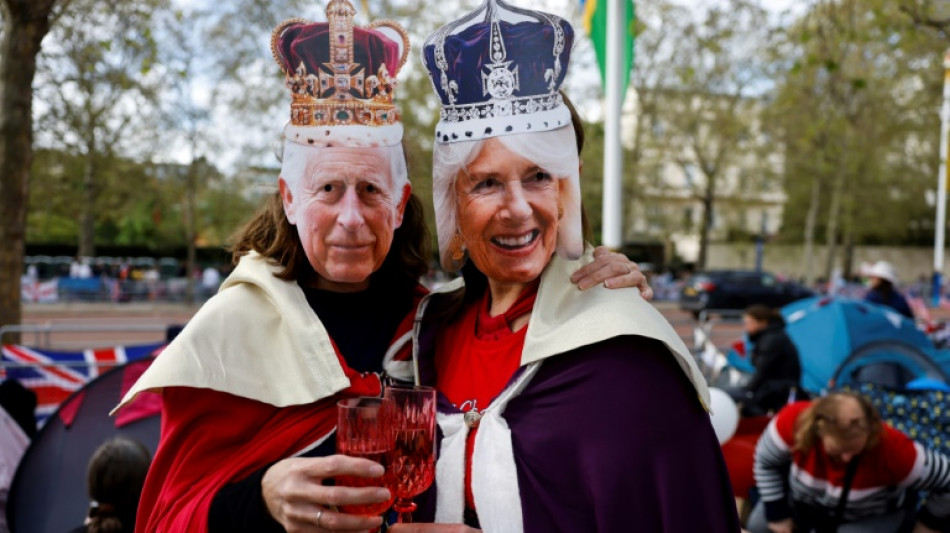

Pomp and protests as UK poised for first coronation in 70 years
Britain's first coronation in 70 years takes place on Saturday, with Charles III crowned king in an elaborate Christian ceremony steeped in solemn ritual and more than a millennium of history.
The coronation -- the first of a British king since 1937 -- is the religious confirmation of his accession after the death of his mother, Queen Elizabeth II, last September.
Much of the Anglican service at London's Westminster Abbey, which will also see Charles's second wife Camilla crowned queen, would be recognisable to the 74-year-old king's forebears 1,000 years ago.
But there will also be a clear departure with the involvement of women bishops, minority faith leaders, and a more diverse and representative guest list of British society than the lords and ladies of old.
So too is the environmental theme at the ceremony, including vegan anointing oil and recycled ceremonial garb, reflecting Charles's lifelong championing of sustainability and biodiversity.
Prime Minister Rishi Sunak on Friday called the event "a moment of enormous national pride" and a "demonstration of our country's character".
"It's an opportunity for us to all look to the future and a spirit of service, hope and unity," he told Sky News.
- Opposition -
Not everyone is in the mood to celebrate, however. Republican opponents who want an elected head of state plan to protest on the day with signs declaring "Not my king".
Younger people, too, say the coronation -- and the monarchy in general -- leaves them cold, according to polling.
Further afield, Charles's position looks increasingly tenuous as the hereditary monarch in 14 Commonwealth countries outside the UK.
Australia, Belize and Jamaica are already indicating moves towards becoming republics while Charles is also facing calls to apologise for his ancestors' involvement in colonialism and the slave trade.
Back home, political leaders will be hoping the coronation will show Britain at its best, going some way to repair the country's international standing dented by its exit from the European Union.
The presidents of France and Germany and senior EU leaders will be among the 2,300 guests attending, along with global royalty.
Charles on Friday juggled final rehearsals with diplomatic niceties, but also found time to greet the crowds camped out to stake a prime spot for the coronation parade.
The monarch joined prime ministers and governors-general from some of the Commonwealth countries where he is head of state for lunch, before heading to a Commonwealth Heads of Government meeting and garden reception.
- Cost -
Carol Fairfax, 54, her eight-year-old son Charlie, and her sister Karen Chamberlain, 57, travelled from Birmingham in central England kitted up with tents and sleeping bags.
"It's so exciting," charity worker Chamberlain told AFP.
"Our mother came to London in 1953. Being here is a way to say we are proud of the monarchy. Hopefully we'll still be here when (Charles's heir) William becomes king," she said.
Rail commuters are getting a regal reminder over the weekend to "mind the gap" between the platform and the train: Charles and Camilla have recorded a message to be played at train stations across the country.
But the celebratory mood and the opulent display of jewels, crowns and gilded coaches sits uneasily with many Britons struggling due to the rising cost of living, plus widespread strike action for better pay.
"We are not living the same life. At this time people are struggling," Eden Eawit, 38, told AFP in north London.
"I cook only two days a week, I eat only sandwiches. Some people are not eating at all. It is very hard," she said.
- Pageantry -
Much of the final taxpayer-funded bill, widely estimated to be upwards of £100 million ($126 million), is likely to come from the huge security operation.
A Buckingham Palace spokesman said, however, that global interest "more than repays the expenditure that goes with it".
UKHospitality, a trade body, said the three-day coronation weekend, which includes a public holiday on Monday, could generate £350 million for the sector including pubs.
All the stops have been pulled out for the biggest display of British pomp and pageantry in decades, outstripping the queen's state funeral last September.
In all, around 7,000 military personnel -- from mounted troops to marching bands -- will take part in a parade rehearsed with minute precision.
At the palace, they will take a salute from members of the armed forces, then watch a ceremonial fly-past from the balcony with other members of the royal family.
J.Fletcher--NG



